
Event Overview
The transition to a climate-neutral society is an urgent challenge and an opportunity to build a better future for all. But how do we get there? So far, much of the emphasis in Europe has been on the shift to electric vehicles, which is certainly welcome. However, on its own and without the parallel development of alternative transport types that are suited to the urban environment, the risk is that while we may see more electric vehicles on the roads, we are further locking in a transport infrastructure predominantly dedicated to large vehicles such as cars.
LEVA-EU, as the trade body for the Light Electric Vehicle sector, has commissioned a report from the renowned German research centre, DLR, which analyses the contribution that LEVs can make in replacing car journeys and cutting more deeply into CO2 emissions, creating greener and more liveable spaces. This report, which will be presented and discussed at the event on the 24 March in Brussels, aims at complementing the considerable work of the European Commission so far. It is clear that with higher ambitions and given the right policy environment across cities, Member States, and at the EU-level, LEVs can substantially positively impact climate change, transport as well as the health and well-being of Europe’s citizens.
Event Replays & Pictures
Moderated by:

Dr. Brendan Hill
Sustainability Consultant
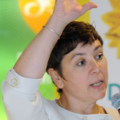
Degree of Civic and Administrative Science, University of Ghent, Belgium
Degree of Licentiate Political Sciences, University of Ghent, Belgium
Freelance journalist for European and national trade and consumer cycling magazines writing on various two-wheel subject matters.
Since 1996 Secretary-General of ETRA, European Two-Wheel Retailers’ Association.


Mascha Brost works as a researcher at the German Aerospace Center (DLR), Institute of Vehicle Concepts in Stuttgart, Germany, at the department of “Vehicle Systems and Technology Assessment”. She conducts research in the area of new vehicle and mobility concepts. Her focus is on sustainable mobility solutions, including light electric vehicle (LEV) concepts. She researched this topic, for example, in the context of the study “Elektrische Klein- und Leichtfahrzeuge. Chancen und Potenziale für Baden-Württemberg”, as part of the IEAHEV TCP Taskforce 32 “Small Electric Vehicles” and as one of the editors of the book Small Electric Vehicles – an international view on light three- and four-wheelers (Springer). She received her diploma in mechanical engineering from the University of Stuttgart, Germany and complemented her technical education with a master’s degree in Integral Design Studies, an international, interdisciplinary programme of the Stuttgart State Academy of Art and Design. She applied the combination of technical development and artistic product design in a product design office before she started scientific research at DLR.

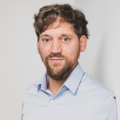
Mirko Goletz is researcher at the Institute of Transport Research, based at the DLR in Berlin, Germany. Having a background in Economics, he holds a Master of Science from Free University Berlin. He has spent more than 10 years in transport research and currently leads a team on new mobility concepts and automation at DLR. His main research focusses on the impacts of platform based mobility services on urban mobility, accessibility analysis and the interlinkage of new and existing modes. Furthermore, he has extensively researched the usage of global and open data sources and ways to combine these data to appraise mobility on a global scale. Results from his work has been published in numerous scientific articles and book chapters and he is an active member in international transportation working groups and networks.


Stephan A. Schmid is head of the department “Vehicle Systems and Technology Assessment” at the Institute of Vehicle Concepts of the German Aerospace Center (DLR) in Stuttgart, Germany. Together with his team, he is working on new vehicle concepts for road and rail, focusing on energy, emissions and costs. The vision of his research is to identify technically and economically feasible and sustainable ways forward for the transport sector. He is National Scientific Delegate of Germany to the IEA Hybrid and Electric Vehicle Technology Collaboration Programme since 2011. From 2011 to 2013, he represented DLR's transport programme and research activities at DLR's Brussels office in Belgium. Stephan Schmid received his diploma (Dipl.-Ing.) in mechanical engineering from the Technical University of Karlsruhe (Germany) and his doctorate (Dr.-Ing.) in mechanical engineering from the University of Stuttgart (Germany).


Simone Ehrenberger is a researcher at the German Aerospace Center (DLR), Institute for Vehicle Concepts in Stuttgart, Germany, at the department of “Vehicle Systems and Technology Assessment”. Her research focuses on life cycle assessment of vehicle components as well as the economic assessment of new train concepts and their operational potentials. She graduated from the University of Karlsruhe and holds a diploma in geoecology. Before joining the Institute for Vehicle Concepts, she worked on projects in the field of life cycle assessment with the research group for material flow and resource management at the Institute of Applied Sciences at Pforzheim University.


Dr Brendan Hill is an educator, consultant and entrepreneur with a background in communications, sustainability and change. A former BBC journalist, educated in ecology, resource management and psychology, he has long advocated that humanity and particularly developed societies – having already overstepped nature’s carrying capacity – must course-correct, but that consumerist mental models and systems of governance are barely able to grasp, let alone deliver, what needs to be done. Consequently he works mainly on bringing about change in and through businesses and other enterprises. He is a lifelong cyclist who maintains that muscle power alone can never meet every mobility need, leaving us no option but to make power-assisted vehicles orders of magnitude more efficient than cars as we know them, ubiquitous.


Marian-Jean Marinescu is Member of the European Parliament and was Vice- President of the Group of the European People’s Party (Christian Democrats) between 2007 and 2019. He joined the European Parliament in 2007 when Romania joined the European Union being from 2006 to 2007 an Observer in the European Parliament on behalf of Romania. He is the speaker of the EPP Group within the Committee on Transport and Tourism (TRAN) being very active in the Committee on Budgetary Control (CONT) and the Committee on Industry, Research and Energy (ITRE) as well, where he is substitute. Moreover, his work as a rapporteur is impressive which makes him a vital agent for the Romanian delegation and the Parliament itself. He was the Rapporteur for the Regulation on the European Aviation Safety Agency (EASA), Connecting Europe Facility (CEF), OLAF and the author of several pilot projects such as A New Architecture of the European airspace, Quality of service in tourism and Space Traffic management among others. He is currently Parliament’s rapporteur on SES 2+ Regulation. Born in Râmnicu Vâlcea, Romania, Marinescu graduated the Bucharest Politehnica Institute’s Faculty of Aerospace engineering in 1976, and subsequently worked as an engineer for Avioane SA and Aviation Institute branch in Craiova, Romania. Before joining the European Parliament, he was Member of the Romanian Parliament, Chamber of Deputies (2004-2007). His main research interests lie in the field of Aviation Engineering Technology.


Dr. Michael Kyriakopoulos serves the European Commission, as Senior Expert and contributes in setting the European Aviation Research Policy in DG Research and Innovation. Michael is responsible for the definition of EU aviation Horizon Europe research and innovation programmes, their oversight as well as contributes to EU Better Regulation of the aviation-relevant EU Policies (EU Green Deal and Industrial Strategy).
Michael is a Mechanical and Aeronautics Engineer with a PhD on computational methods for aerospace applications. He has 30+ years of experience in aeronautics research, in academia, research establishments, industry and the European Commission. Prior to joining the European Commission, Michael has authored/co-authored 40+ scientific publications and contributed/led aerospace, defence and energy industrial projects.

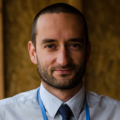
Lucas Demuelenaere is Mobility and Clean Air Advisor for the Brussels Minister of Climate, Energy, Environment, H.E. Alain Maron. In this context, he coordinates several projects related to the decarbonization of transport in the Brussels-capital Region, such as the progressive implementation of a thermic ban in the city, the deployment of a network of electric vehicle charging stations and works on the implementation of an intelligent congestion charge. In the past, he also worked on the international and Belgian climate policy, including on the implementation of a national carbon pricing system.


Degree of Civic and Administrative Science, University of Ghent, Belgium
Degree of Licentiate Political Sciences, University of Ghent, Belgium
Freelance journalist for European and national trade and consumer cycling magazines writing on various two-wheel subject matters.
Since 1996 Secretary-General of ETRA, European Two-Wheel Retailers’ Association.


Bram Rotthier graduated as master in energy engineering. After obtaining his degree he joined the E&A research group of KU Leuven, where he worked for six years as researcher on light electric vehicles. Currently he is the Head of Department Energy Technology at Odisee University of applied sciences and active as technical director of LEVA-EU.


Mascha Brost works as a researcher at the German Aerospace Center (DLR), Institute of Vehicle Concepts in Stuttgart, Germany, at the department of “Vehicle Systems and Technology Assessment”. She conducts research in the area of new vehicle and mobility concepts. Her focus is on sustainable mobility solutions, including light electric vehicle (LEV) concepts. She researched this topic, for example, in the context of the study “Elektrische Klein- und Leichtfahrzeuge. Chancen und Potenziale für Baden-Württemberg”, as part of the IEAHEV TCP Taskforce 32 “Small Electric Vehicles” and as one of the editors of the book Small Electric Vehicles – an international view on light three- and four-wheelers (Springer). She received her diploma in mechanical engineering from the University of Stuttgart, Germany and complemented her technical education with a master’s degree in Integral Design Studies, an international, interdisciplinary programme of the Stuttgart State Academy of Art and Design. She applied the combination of technical development and artistic product design in a product design office before she started scientific research at DLR.


Mirko Goletz is researcher at the Institute of Transport Research, based at the DLR in Berlin, Germany. Having a background in Economics, he holds a Master of Science from Free University Berlin. He has spent more than 10 years in transport research and currently leads a team on new mobility concepts and automation at DLR. His main research focusses on the impacts of platform based mobility services on urban mobility, accessibility analysis and the interlinkage of new and existing modes. Furthermore, he has extensively researched the usage of global and open data sources and ways to combine these data to appraise mobility on a global scale. Results from his work has been published in numerous scientific articles and book chapters and he is an active member in international transportation working groups and networks.


Stephan A. Schmid is head of the department “Vehicle Systems and Technology Assessment” at the Institute of Vehicle Concepts of the German Aerospace Center (DLR) in Stuttgart, Germany. Together with his team, he is working on new vehicle concepts for road and rail, focusing on energy, emissions and costs. The vision of his research is to identify technically and economically feasible and sustainable ways forward for the transport sector. He is National Scientific Delegate of Germany to the IEA Hybrid and Electric Vehicle Technology Collaboration Programme since 2011. From 2011 to 2013, he represented DLR's transport programme and research activities at DLR's Brussels office in Belgium. Stephan Schmid received his diploma (Dipl.-Ing.) in mechanical engineering from the Technical University of Karlsruhe (Germany) and his doctorate (Dr.-Ing.) in mechanical engineering from the University of Stuttgart (Germany).


Simone Ehrenberger is a researcher at the German Aerospace Center (DLR), Institute for Vehicle Concepts in Stuttgart, Germany, at the department of “Vehicle Systems and Technology Assessment”. Her research focuses on life cycle assessment of vehicle components as well as the economic assessment of new train concepts and their operational potentials. She graduated from the University of Karlsruhe and holds a diploma in geoecology. Before joining the Institute for Vehicle Concepts, she worked on projects in the field of life cycle assessment with the research group for material flow and resource management at the Institute of Applied Sciences at Pforzheim University.


Dr Brendan Hill is an educator, consultant and entrepreneur with a background in communications, sustainability and change. A former BBC journalist, educated in ecology, resource management and psychology, he has long advocated that humanity and particularly developed societies – having already overstepped nature’s carrying capacity – must course-correct, but that consumerist mental models and systems of governance are barely able to grasp, let alone deliver, what needs to be done. Consequently he works mainly on bringing about change in and through businesses and other enterprises. He is a lifelong cyclist who maintains that muscle power alone can never meet every mobility need, leaving us no option but to make power-assisted vehicles orders of magnitude more efficient than cars as we know them, ubiquitous.


Dr. Chris Cherry is a Professor in Civil Engineering at the University of Tennessee. His research is centered on the intersection of policy, technology, travel behavior, safety and sustainability in the transportation sector. His past and current work spans the globe, with projects in Asia and the US. Focusing on low-impact transportation modes like e-bikes and e-scooters, much of the work of his career has aimed to understand the role of lightweight electric vehicles (micromobility) in the transportation space, starting with his PhD dissertation on e-bikes in China from UC Berkeley in 2007. He directs the Light Electric Vehicle Education and Research (LEVER) Institute and is a PI on several ongoing projects focused on behavior, sustainability, and safety of vulnerable road users that include pedestrians and micromobility users.


Dr Frauke Behrendt’s is Associate Professor in Transitions to Sustainable Mobility at the Technology, Innovation and Society Group at the Eindhoven University of Technology. Her expertise is on smart, active and sustainable mobility as well as digital culture. She set up several funded projects on micromobilities, including “Innovative Light ELEctric Vehicles for Active and Digital TravEl: Reducing mobility-related energy demand and carbon emissions (ELEVATE)” and “Smart e-bikes”. Previously, she worked at the Universities of Brighton and Sussex (UK) and the Rhode Island School of Design (US).




Laura Po is an Associate Professor at the “Enzo Ferrari” Engineering Department of the University of Modena e Reggio Emilia and participates as a senior researcher in the Big Data Research Group (http://www.dbgroup.unimo.it/).
Her research interests include Big Dataset Visualization, Web and Information Systems, Artificial Intelligence techniques, Knowledge and Ontology Design, Word Sense Disambiguation, Data Stream Management, Linked (open) data, Open Government and Smart Cities.
She is co-founder and member of the Scientific Committee of the Spin-off DataRiver srl which designs and develops solutions for data integration using techniques coming from research in the field of the Semantic Web since 2009.
She is a member of the Board of the International Doctoral School in ICT of the University of Modena and Reggio Emilia and a member of two Interdepartmental Research Centers at UNIMORE: DHMore on Digital Humanities and AIRI, the Artificial Intelligence Research and Innovation Center.
She has also been involved in several national and European research projects. Recently, she led the European Project “TRAFAIR-Understanding Traffic Flows to Improve Air quality” co-financed by INEA CEF Telecom as part of the CEF-TC-2017-3 Public Open Data call (November 2018 – April 2021).
She is the author of more than 50 publications in scientific journals and international conference proceedings.


Dr Aslak Fyhri is chief research officer for the Transport and Behaviour group at the department of Safety and the Environment at TØI. His background is in Environmental Psychology.His research is concerned with the psychology of transport and the environment. Current areas of interest are bicycling from a mobility and safety perspective, with a particular focus on e-bikes, risk perception and worry in transport, traffic safety for children and people’s perception of the local environment.


Degree of Civic and Administrative Science, University of Ghent, Belgium
Degree of Licentiate Political Sciences, University of Ghent, Belgium
Freelance journalist for European and national trade and consumer cycling magazines writing on various two-wheel subject matters.
Since 1996 Secretary-General of ETRA, European Two-Wheel Retailers’ Association.


Bram Rotthier graduated as master in energy engineering. After obtaining his degree he joined the E&A research group of KU Leuven, where he worked for six years as researcher on light electric vehicles. Currently he is the Head of Department Energy Technology at Odisee University of applied sciences and active as technical director of LEVA-EU.


Degree of Civic and Administrative Science, University of Ghent, Belgium
Degree of Licentiate Political Sciences, University of Ghent, Belgium
Freelance journalist for European and national trade and consumer cycling magazines writing on various two-wheel subject matters.
Since 1996 Secretary-General of ETRA, European Two-Wheel Retailers’ Association.


Mascha Brost works as a researcher at the German Aerospace Center (DLR), Institute of Vehicle Concepts in Stuttgart, Germany, at the department of “Vehicle Systems and Technology Assessment”. She conducts research in the area of new vehicle and mobility concepts. Her focus is on sustainable mobility solutions, including light electric vehicle (LEV) concepts. She researched this topic, for example, in the context of the study “Elektrische Klein- und Leichtfahrzeuge. Chancen und Potenziale für Baden-Württemberg”, as part of the IEAHEV TCP Taskforce 32 “Small Electric Vehicles” and as one of the editors of the book Small Electric Vehicles – an international view on light three- and four-wheelers (Springer). She received her diploma in mechanical engineering from the University of Stuttgart, Germany and complemented her technical education with a master’s degree in Integral Design Studies, an international, interdisciplinary programme of the Stuttgart State Academy of Art and Design. She applied the combination of technical development and artistic product design in a product design office before she started scientific research at DLR.


Mirko Goletz is researcher at the Institute of Transport Research, based at the DLR in Berlin, Germany. Having a background in Economics, he holds a Master of Science from Free University Berlin. He has spent more than 10 years in transport research and currently leads a team on new mobility concepts and automation at DLR. His main research focusses on the impacts of platform based mobility services on urban mobility, accessibility analysis and the interlinkage of new and existing modes. Furthermore, he has extensively researched the usage of global and open data sources and ways to combine these data to appraise mobility on a global scale. Results from his work has been published in numerous scientific articles and book chapters and he is an active member in international transportation working groups and networks.


Stephan A. Schmid is head of the department “Vehicle Systems and Technology Assessment” at the Institute of Vehicle Concepts of the German Aerospace Center (DLR) in Stuttgart, Germany. Together with his team, he is working on new vehicle concepts for road and rail, focusing on energy, emissions and costs. The vision of his research is to identify technically and economically feasible and sustainable ways forward for the transport sector. He is National Scientific Delegate of Germany to the IEA Hybrid and Electric Vehicle Technology Collaboration Programme since 2011. From 2011 to 2013, he represented DLR's transport programme and research activities at DLR's Brussels office in Belgium. Stephan Schmid received his diploma (Dipl.-Ing.) in mechanical engineering from the Technical University of Karlsruhe (Germany) and his doctorate (Dr.-Ing.) in mechanical engineering from the University of Stuttgart (Germany).


Simone Ehrenberger is a researcher at the German Aerospace Center (DLR), Institute for Vehicle Concepts in Stuttgart, Germany, at the department of “Vehicle Systems and Technology Assessment”. Her research focuses on life cycle assessment of vehicle components as well as the economic assessment of new train concepts and their operational potentials. She graduated from the University of Karlsruhe and holds a diploma in geoecology. Before joining the Institute for Vehicle Concepts, she worked on projects in the field of life cycle assessment with the research group for material flow and resource management at the Institute of Applied Sciences at Pforzheim University.


Dr Brendan Hill is an educator, consultant and entrepreneur with a background in communications, sustainability and change. A former BBC journalist, educated in ecology, resource management and psychology, he has long advocated that humanity and particularly developed societies – having already overstepped nature’s carrying capacity – must course-correct, but that consumerist mental models and systems of governance are barely able to grasp, let alone deliver, what needs to be done. Consequently he works mainly on bringing about change in and through businesses and other enterprises. He is a lifelong cyclist who maintains that muscle power alone can never meet every mobility need, leaving us no option but to make power-assisted vehicles orders of magnitude more efficient than cars as we know them, ubiquitous.


Marian-Jean Marinescu is Member of the European Parliament and was Vice- President of the Group of the European People’s Party (Christian Democrats) between 2007 and 2019. He joined the European Parliament in 2007 when Romania joined the European Union being from 2006 to 2007 an Observer in the European Parliament on behalf of Romania. He is the speaker of the EPP Group within the Committee on Transport and Tourism (TRAN) being very active in the Committee on Budgetary Control (CONT) and the Committee on Industry, Research and Energy (ITRE) as well, where he is substitute. Moreover, his work as a rapporteur is impressive which makes him a vital agent for the Romanian delegation and the Parliament itself. He was the Rapporteur for the Regulation on the European Aviation Safety Agency (EASA), Connecting Europe Facility (CEF), OLAF and the author of several pilot projects such as A New Architecture of the European airspace, Quality of service in tourism and Space Traffic management among others. He is currently Parliament’s rapporteur on SES 2+ Regulation. Born in Râmnicu Vâlcea, Romania, Marinescu graduated the Bucharest Politehnica Institute’s Faculty of Aerospace engineering in 1976, and subsequently worked as an engineer for Avioane SA and Aviation Institute branch in Craiova, Romania. Before joining the European Parliament, he was Member of the Romanian Parliament, Chamber of Deputies (2004-2007). His main research interests lie in the field of Aviation Engineering Technology.


Dr. Michael Kyriakopoulos serves the European Commission, as Senior Expert and contributes in setting the European Aviation Research Policy in DG Research and Innovation. Michael is responsible for the definition of EU aviation Horizon Europe research and innovation programmes, their oversight as well as contributes to EU Better Regulation of the aviation-relevant EU Policies (EU Green Deal and Industrial Strategy).
Michael is a Mechanical and Aeronautics Engineer with a PhD on computational methods for aerospace applications. He has 30+ years of experience in aeronautics research, in academia, research establishments, industry and the European Commission. Prior to joining the European Commission, Michael has authored/co-authored 40+ scientific publications and contributed/led aerospace, defence and energy industrial projects.


Lucas Demuelenaere is Mobility and Clean Air Advisor for the Brussels Minister of Climate, Energy, Environment, H.E. Alain Maron. In this context, he coordinates several projects related to the decarbonization of transport in the Brussels-capital Region, such as the progressive implementation of a thermic ban in the city, the deployment of a network of electric vehicle charging stations and works on the implementation of an intelligent congestion charge. In the past, he also worked on the international and Belgian climate policy, including on the implementation of a national carbon pricing system.


Degree of Civic and Administrative Science, University of Ghent, Belgium
Degree of Licentiate Political Sciences, University of Ghent, Belgium
Freelance journalist for European and national trade and consumer cycling magazines writing on various two-wheel subject matters.
Since 1996 Secretary-General of ETRA, European Two-Wheel Retailers’ Association.


Bram Rotthier graduated as master in energy engineering. After obtaining his degree he joined the E&A research group of KU Leuven, where he worked for six years as researcher on light electric vehicles. Currently he is the Head of Department Energy Technology at Odisee University of applied sciences and active as technical director of LEVA-EU.


Mascha Brost works as a researcher at the German Aerospace Center (DLR), Institute of Vehicle Concepts in Stuttgart, Germany, at the department of “Vehicle Systems and Technology Assessment”. She conducts research in the area of new vehicle and mobility concepts. Her focus is on sustainable mobility solutions, including light electric vehicle (LEV) concepts. She researched this topic, for example, in the context of the study “Elektrische Klein- und Leichtfahrzeuge. Chancen und Potenziale für Baden-Württemberg”, as part of the IEAHEV TCP Taskforce 32 “Small Electric Vehicles” and as one of the editors of the book Small Electric Vehicles – an international view on light three- and four-wheelers (Springer). She received her diploma in mechanical engineering from the University of Stuttgart, Germany and complemented her technical education with a master’s degree in Integral Design Studies, an international, interdisciplinary programme of the Stuttgart State Academy of Art and Design. She applied the combination of technical development and artistic product design in a product design office before she started scientific research at DLR.


Mirko Goletz is researcher at the Institute of Transport Research, based at the DLR in Berlin, Germany. Having a background in Economics, he holds a Master of Science from Free University Berlin. He has spent more than 10 years in transport research and currently leads a team on new mobility concepts and automation at DLR. His main research focusses on the impacts of platform based mobility services on urban mobility, accessibility analysis and the interlinkage of new and existing modes. Furthermore, he has extensively researched the usage of global and open data sources and ways to combine these data to appraise mobility on a global scale. Results from his work has been published in numerous scientific articles and book chapters and he is an active member in international transportation working groups and networks.


Stephan A. Schmid is head of the department “Vehicle Systems and Technology Assessment” at the Institute of Vehicle Concepts of the German Aerospace Center (DLR) in Stuttgart, Germany. Together with his team, he is working on new vehicle concepts for road and rail, focusing on energy, emissions and costs. The vision of his research is to identify technically and economically feasible and sustainable ways forward for the transport sector. He is National Scientific Delegate of Germany to the IEA Hybrid and Electric Vehicle Technology Collaboration Programme since 2011. From 2011 to 2013, he represented DLR's transport programme and research activities at DLR's Brussels office in Belgium. Stephan Schmid received his diploma (Dipl.-Ing.) in mechanical engineering from the Technical University of Karlsruhe (Germany) and his doctorate (Dr.-Ing.) in mechanical engineering from the University of Stuttgart (Germany).


Simone Ehrenberger is a researcher at the German Aerospace Center (DLR), Institute for Vehicle Concepts in Stuttgart, Germany, at the department of “Vehicle Systems and Technology Assessment”. Her research focuses on life cycle assessment of vehicle components as well as the economic assessment of new train concepts and their operational potentials. She graduated from the University of Karlsruhe and holds a diploma in geoecology. Before joining the Institute for Vehicle Concepts, she worked on projects in the field of life cycle assessment with the research group for material flow and resource management at the Institute of Applied Sciences at Pforzheim University.


Dr Brendan Hill is an educator, consultant and entrepreneur with a background in communications, sustainability and change. A former BBC journalist, educated in ecology, resource management and psychology, he has long advocated that humanity and particularly developed societies – having already overstepped nature’s carrying capacity – must course-correct, but that consumerist mental models and systems of governance are barely able to grasp, let alone deliver, what needs to be done. Consequently he works mainly on bringing about change in and through businesses and other enterprises. He is a lifelong cyclist who maintains that muscle power alone can never meet every mobility need, leaving us no option but to make power-assisted vehicles orders of magnitude more efficient than cars as we know them, ubiquitous.


Dr. Chris Cherry is a Professor in Civil Engineering at the University of Tennessee. His research is centered on the intersection of policy, technology, travel behavior, safety and sustainability in the transportation sector. His past and current work spans the globe, with projects in Asia and the US. Focusing on low-impact transportation modes like e-bikes and e-scooters, much of the work of his career has aimed to understand the role of lightweight electric vehicles (micromobility) in the transportation space, starting with his PhD dissertation on e-bikes in China from UC Berkeley in 2007. He directs the Light Electric Vehicle Education and Research (LEVER) Institute and is a PI on several ongoing projects focused on behavior, sustainability, and safety of vulnerable road users that include pedestrians and micromobility users.


Dr Frauke Behrendt’s is Associate Professor in Transitions to Sustainable Mobility at the Technology, Innovation and Society Group at the Eindhoven University of Technology. Her expertise is on smart, active and sustainable mobility as well as digital culture. She set up several funded projects on micromobilities, including “Innovative Light ELEctric Vehicles for Active and Digital TravEl: Reducing mobility-related energy demand and carbon emissions (ELEVATE)” and “Smart e-bikes”. Previously, she worked at the Universities of Brighton and Sussex (UK) and the Rhode Island School of Design (US).




Laura Po is an Associate Professor at the “Enzo Ferrari” Engineering Department of the University of Modena e Reggio Emilia and participates as a senior researcher in the Big Data Research Group (http://www.dbgroup.unimo.it/).
Her research interests include Big Dataset Visualization, Web and Information Systems, Artificial Intelligence techniques, Knowledge and Ontology Design, Word Sense Disambiguation, Data Stream Management, Linked (open) data, Open Government and Smart Cities.
She is co-founder and member of the Scientific Committee of the Spin-off DataRiver srl which designs and develops solutions for data integration using techniques coming from research in the field of the Semantic Web since 2009.
She is a member of the Board of the International Doctoral School in ICT of the University of Modena and Reggio Emilia and a member of two Interdepartmental Research Centers at UNIMORE: DHMore on Digital Humanities and AIRI, the Artificial Intelligence Research and Innovation Center.
She has also been involved in several national and European research projects. Recently, she led the European Project “TRAFAIR-Understanding Traffic Flows to Improve Air quality” co-financed by INEA CEF Telecom as part of the CEF-TC-2017-3 Public Open Data call (November 2018 – April 2021).
She is the author of more than 50 publications in scientific journals and international conference proceedings.


Dr Aslak Fyhri is chief research officer for the Transport and Behaviour group at the department of Safety and the Environment at TØI. His background is in Environmental Psychology.His research is concerned with the psychology of transport and the environment. Current areas of interest are bicycling from a mobility and safety perspective, with a particular focus on e-bikes, risk perception and worry in transport, traffic safety for children and people’s perception of the local environment.


Degree of Civic and Administrative Science, University of Ghent, Belgium
Degree of Licentiate Political Sciences, University of Ghent, Belgium
Freelance journalist for European and national trade and consumer cycling magazines writing on various two-wheel subject matters.
Since 1996 Secretary-General of ETRA, European Two-Wheel Retailers’ Association.


Bram Rotthier graduated as master in energy engineering. After obtaining his degree he joined the E&A research group of KU Leuven, where he worked for six years as researcher on light electric vehicles. Currently he is the Head of Department Energy Technology at Odisee University of applied sciences and active as technical director of LEVA-EU.

Speakers include
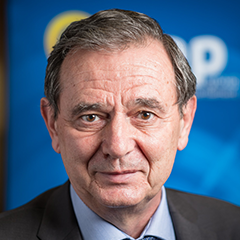
 Marian-Jean Marinescu, MEP
Marian-Jean Marinescu, MEP
Marian-Jean Marinescu is Member of the European Parliament and was Vice- President of the Group of the European People’s Party (Christian Democrats) between 2007 and 2019. He joined the European Parliament in 2007 when Romania joined the European Union being from 2006 to 2007 an Observer in the European Parliament on behalf of Romania. He is the speaker of the EPP Group within the Committee on Transport and Tourism (TRAN) being very active in the Committee on Budgetary Control (CONT) and the Committee on Industry, Research and Energy (ITRE) as well, where he is substitute. Moreover, his work as a rapporteur is impressive which makes him a vital agent for the Romanian delegation and the Parliament itself. He was the Rapporteur for the Regulation on the European Aviation Safety Agency (EASA), Connecting Europe Facility (CEF), OLAF and the author of several pilot projects such as A New Architecture of the European airspace, Quality of service in tourism and Space Traffic management among others. He is currently Parliament’s rapporteur on SES 2+ Regulation. Born in Râmnicu Vâlcea, Romania, Marinescu graduated the Bucharest Politehnica Institute’s Faculty of Aerospace engineering in 1976, and subsequently worked as an engineer for Avioane SA and Aviation Institute branch in Craiova, Romania. Before joining the European Parliament, he was Member of the Romanian Parliament, Chamber of Deputies (2004-2007). His main research interests lie in the field of Aviation Engineering Technology.
Marian-Jean Marinescu
Member,
European Parliament
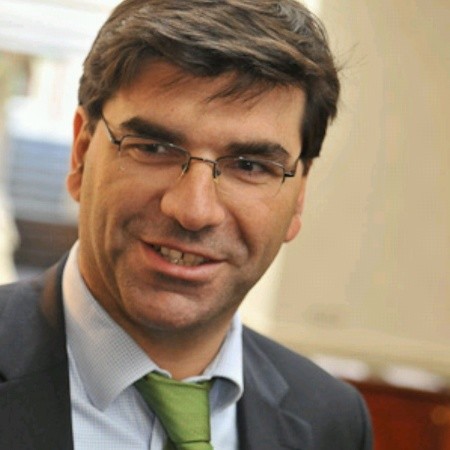
 Dr. Michael Kyriakopoulos, Senior Expert, European Commission
Dr. Michael Kyriakopoulos, Senior Expert, European Commission
Dr. Michael Kyriakopoulos serves the European Commission, as Senior Expert and contributes in setting the European Aviation Research Policy in DG Research and Innovation. Michael is responsible for the definition of EU aviation Horizon Europe research and innovation programmes, their oversight as well as contributes to EU Better Regulation of the aviation-relevant EU Policies (EU Green Deal and Industrial Strategy).
Michael is a Mechanical and Aeronautics Engineer with a PhD on computational methods for aerospace applications. He has 30+ years of experience in aeronautics research, in academia, research establishments, industry and the European Commission. Prior to joining the European Commission, Michael has authored/co-authored 40+ scientific publications and contributed/led aerospace, defence and energy industrial projects.
Dr. Michael Kyriakopoulos
Senior Expert,
European Commission
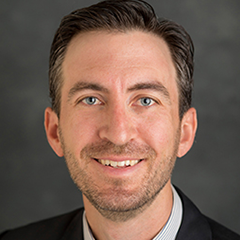
 Christopher Cherry, Professor, Department of Civil and Environmental Engineering, University of Tennessee
Christopher Cherry, Professor, Department of Civil and Environmental Engineering, University of Tennessee
Dr. Chris Cherry is a Professor in Civil Engineering at the University of Tennessee. His research is centered on the intersection of policy, technology, travel behavior, safety and sustainability in the transportation sector. His past and current work spans the globe, with projects in Asia and the US. Focusing on low-impact transportation modes like e-bikes and e-scooters, much of the work of his career has aimed to understand the role of lightweight electric vehicles (micromobility) in the transportation space, starting with his PhD dissertation on e-bikes in China from UC Berkeley in 2007. He directs the Light Electric Vehicle Education and Research (LEVER) Institute and is a PI on several ongoing projects focused on behavior, sustainability, and safety of vulnerable road users that include pedestrians and micromobility users.
Christopher Cherry
Professor, Department of Civil and Environmental Engineering,
University of Tennessee
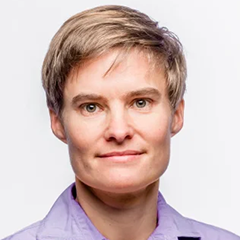
 Frauke Behrendt, Associate Professor, Industrial Engineering and Innovation Sciences, Technology, Innovation & Society, Eindhoven University of Technology
Frauke Behrendt, Associate Professor, Industrial Engineering and Innovation Sciences, Technology, Innovation & Society, Eindhoven University of Technology
Dr Frauke Behrendt’s is Associate Professor in Transitions to Sustainable Mobility at the Technology, Innovation and Society Group at the Eindhoven University of Technology. Her expertise is on smart, active and sustainable mobility as well as digital culture. She set up several funded projects on micromobilities, including “Innovative Light ELEctric Vehicles for Active and Digital TravEl: Reducing mobility-related energy demand and carbon emissions (ELEVATE)” and “Smart e-bikes”. Previously, she worked at the Universities of Brighton and Sussex (UK) and the Rhode Island School of Design (US).
Frauke Behrendt
Associate Professor, Industrial Engineering and Innovation Sciences, Technology, Innovation & Society, Eindhoven University of Technology
Sponsors
Sponsorship
If you are interested in sponsoring at The Future is Electric and Light Conference, please get in touch via the button below:
Contact
If you are interested in discussing the programme:
Annick Roetynck
annick@leva-eu.com
+32 9 278 45 46
For more information on event logistics:
Hayley Scrowther
hayley.scrowther@forum-europe.com
+44 (0) 2920 783 076